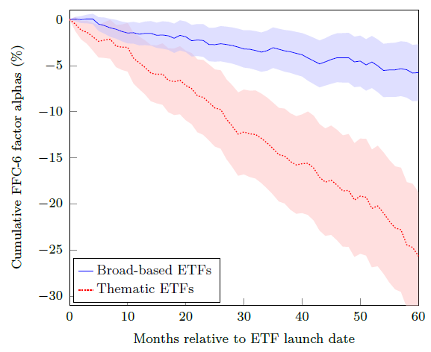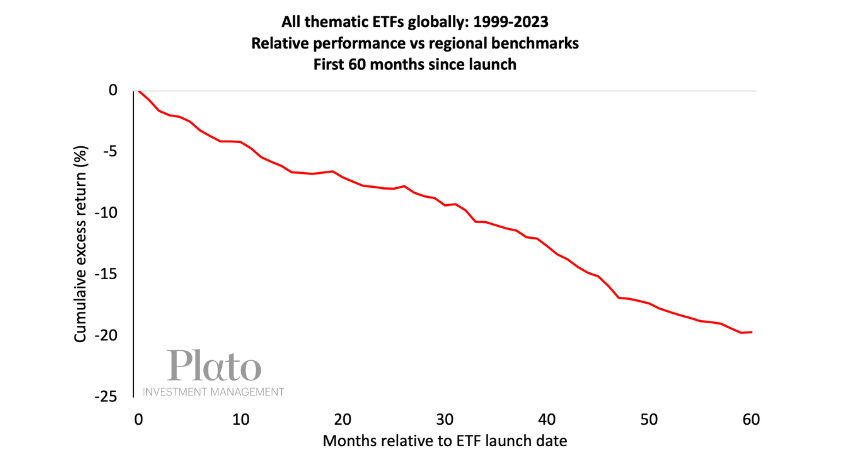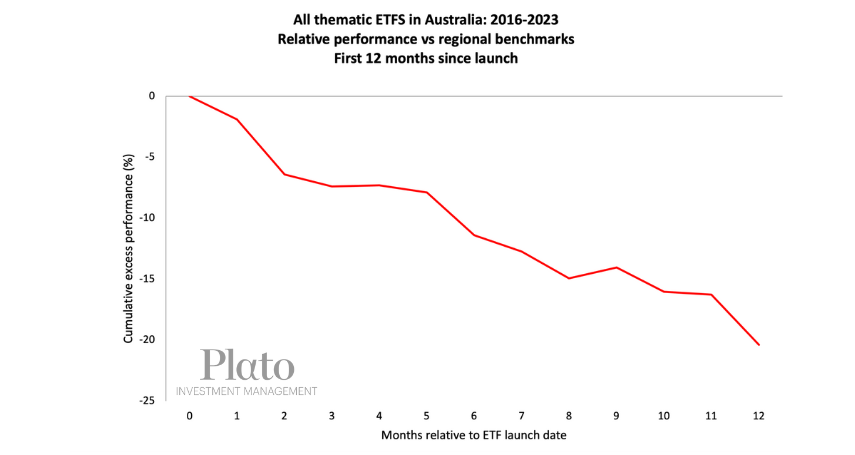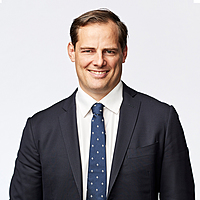Thematic ETFs: The trend is not your friend
In the early days of Apple, Steven Job’s was a notoriously poor presenter, peppering the audience with esoteric technical details. Then, one day, after a particularly dry, stilted performance, a friend said to him: “Steve, just get up there and tell three stories”.
Jobs went onto become a marketing virtuoso with his Apple product launches commanding worldwide audiences.
Marketing experts will tell you we are hardwired to acquire knowledge via story-telling – a trait engrained in humankind as we huddled around the primeval campfire.
Tell a person a statistic, and they will forget it five minutes later. Tell a person a great story and they will remember it five years later.
This hasn't been lost on the asset management industry, and perhaps where you'll find the art of the narrative most ingrained surrounds passive thematic ETFs.
These products invest in an index that maps onto an investment theme, tapping into our insatiable desire for an enticing narrative.
A few come to mind.
Battery Tech ETFs
"In less than 10 years, 25% of all new vehicles will be electric, creating exponential demand for Lithium and Lithium batteries."
Robotics and Artificial Intelligence ETFs
"The machines are coming! Robots will replace human labour - from fruit picking to neurosurgery."
Cryptocurrency ETFs
"Governments are conspiring to debase fiat currencies. Decentralised crypto currencies are a superior store of wealth."
Examining the performance of passive thematic ETFs?
In March, an influential paper titled Competition for Attention in the ETF Space was published in the Review of Financial Studies - arguably the pre-eminent finance journal in the world. It found specialised ETFs that focus on an investment thematic lose about 25% on a risk-adjusted basis over their first five years.
The authors suggested this striking underperformance is driven by the overvaluation of the stocks at the time of the ETF launch.
This makes sense. Thematic ETFs are often launched when public fervour is at its peak.
The risk-adjusted performance of the ETFs in the first 60 months after launch is illustrated below.

Source: Courtesy of Itzhak Ben-David, Francesco Franzoni, Byungwook Kim, Rabih Moussawi (2023)
The ETFs in this study were U.S. market listed between 1993 and 2019.
Broadening the passive thematic ETF analysis
A fair question is whether this severe underperformance is confined to the US.
To answer this question, we looked at all thematic ETFs in the Morningstar database between 1999 and 2023 and measured their performance, relative to the relevant equity benchmarks depending on the ETF’s geographic focus (we include dead and delisted ETFs to avoid survivorship bias where only the strong performing ETFs survive).
Thematic ETFs globally follow the same pattern as in the US, underperforming the index by over 20% on average over the first five years.

Source: Plato Investment Management, Morningstar data, 2023
It worth highlighting the underperformance is not just seen over a short term time horizon, it continues five years after launch.
So, what about here in Australia? Is it a good idea to jump on the latest passive thematic ETF?
Passive thematic ETFs in Australia are a more recent development and there are not many funds with five years of history, so we just focus on the first twelve months post-launch. We see below that the average Australian thematic ETF underperforms the benchmark by 20% over the first year since launch.
The evidence suggests that when a passive thematic ETF launches, you are likely better off going short rather than long.

We are not saying that thematic investing full stop is unwise.
Simply that thematic ETFs are often launched when the market is over-valuing the thematic and, if history is a guide, future performance is likely to be poor.
A further criticism of passive thematic ETFs is they tend to select stocks on their alignment with the thematic alone, without any regard for fundamentals.
What are the valuations? How strong are the balance sheets? What are the competitive advantages? Ignoring these basic questions may also explain the poor performance of thematic ETFs.
Active ETFs that actually assess the quality of the companies they are investing in are an entirely different beast. An additional drawback of thematic ETFs is the eye-watering volatility, often 50-100% higher than a standard equity ETF.
At Plato, our strategies apply an all-weather investment approach that combines the very best value, quality, and growth opportunities, and not tied to any one thematic.
Discover more insights from Plato Investment Management
Dr David Allen is Plato's Head of Long Short Strategies at the Portfolio Manager of the Plato Global Alpha Fund.
Visit the Plato website, or find the Plato team on LinkedIn or Twitter

